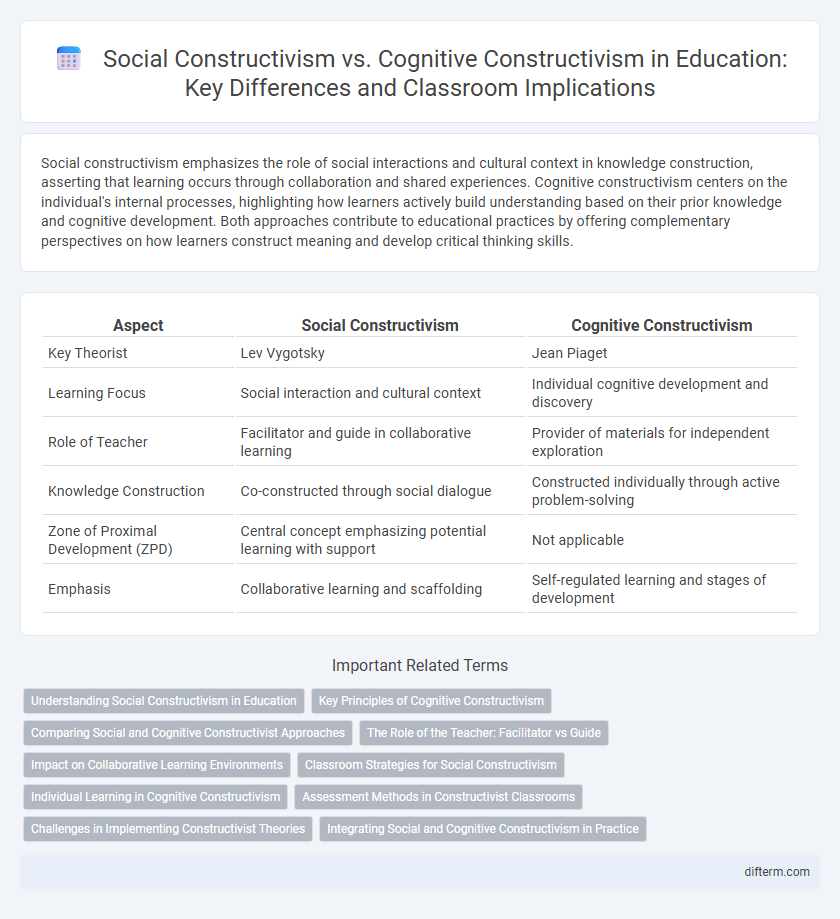Social constructivism emphasizes the role of social interactions and cultural context in knowledge construction, asserting that learning occurs through collaboration and shared experiences. Cognitive constructivism centers on the individual's internal processes, highlighting how learners actively build understanding based on their prior knowledge and cognitive development. Both approaches contribute to educational practices by offering complementary perspectives on how learners construct meaning and develop critical thinking skills.
Table of Comparison
| Aspect | Social Constructivism | Cognitive Constructivism |
|---|---|---|
| Key Theorist | Lev Vygotsky | Jean Piaget |
| Learning Focus | Social interaction and cultural context | Individual cognitive development and discovery |
| Role of Teacher | Facilitator and guide in collaborative learning | Provider of materials for independent exploration |
| Knowledge Construction | Co-constructed through social dialogue | Constructed individually through active problem-solving |
| Zone of Proximal Development (ZPD) | Central concept emphasizing potential learning with support | Not applicable |
| Emphasis | Collaborative learning and scaffolding | Self-regulated learning and stages of development |
Understanding Social Constructivism in Education
Social constructivism in education emphasizes learning as a collaborative process where knowledge is co-constructed through social interactions within cultural contexts. It highlights the role of language, dialogue, and shared experiences in shaping understanding and cognitive development. Vygotsky's theory of the Zone of Proximal Development (ZPD) is central, illustrating how learners advance by engaging with more knowledgeable peers or instructors.
Key Principles of Cognitive Constructivism
Cognitive constructivism emphasizes individual knowledge construction through active engagement and internal mental processes, rooted in Piaget's theory of cognitive development. It prioritizes schema formation, assimilation, and accommodation as mechanisms by which learners organize and adapt new information. Key principles include the importance of developmental stages, discovery learning, and learner-centered activities that promote critical thinking and problem-solving skills.
Comparing Social and Cognitive Constructivist Approaches
Social constructivism emphasizes collaborative learning through social interaction and cultural context, highlighting the role of language and community in knowledge construction. Cognitive constructivism centers on individual internal cognitive processes, where learners actively build understanding through experience and reflection. Comparing both reveals social constructivism's focus on external influences and cognitive constructivism's emphasis on personal mental frameworks.
The Role of the Teacher: Facilitator vs Guide
In education, social constructivism positions the teacher as a facilitator who fosters collaborative learning environments, encouraging students to construct knowledge through social interaction and shared experiences. Cognitive constructivism views the teacher as a guide aiding individual learners in internalizing concepts and developing personal understanding through active problem-solving. Emphasizing either approach shapes instructional strategies, with facilitation promoting dialogue and group exploration, while guidance supports individualized cognitive development.
Impact on Collaborative Learning Environments
Social constructivism emphasizes the role of social interaction and cultural context in knowledge construction, enhancing collaborative learning environments by encouraging dialogue, shared problem-solving, and peer feedback. Cognitive constructivism focuses on individual mental processes and scaffolding, supporting collaboration through guided discovery and personalized learning experiences that build on prior knowledge. Both theories promote active engagement but differ in their approaches: social constructivism prioritizes group dynamics, while cognitive constructivism centers on internal cognitive development.
Classroom Strategies for Social Constructivism
Social constructivism in education emphasizes collaborative learning where students engage in group discussions, peer teaching, and shared problem-solving to co-construct knowledge. Classroom strategies include using scaffolding techniques, guided questioning, and interactive activities that promote social interaction and collective meaning-making. Teachers act as facilitators, creating a learning environment that supports dialogue and cultural tools to enhance cognitive development.
Individual Learning in Cognitive Constructivism
Cognitive constructivism emphasizes individual learning as an active, self-directed process where learners build knowledge through personal experiences and reflection. This theory, rooted in Jean Piaget's work, highlights the importance of internal cognitive structures and developmental stages in shaping understanding. Unlike social constructivism, which focuses on collaborative learning and social interaction, cognitive constructivism prioritizes solitary exploration and mental organization of concepts.
Assessment Methods in Constructivist Classrooms
Assessment methods in social constructivist classrooms emphasize collaborative projects, peer evaluations, and authentic tasks that reflect real-world contexts, supporting knowledge construction through social interaction. In contrast, cognitive constructivist assessments focus on individual problem-solving tasks, reflective journals, and concept mapping to gauge personal understanding and cognitive development. Both approaches prioritize formative assessment techniques over traditional testing to promote deeper learning and metacognition.
Challenges in Implementing Constructivist Theories
Implementing social constructivism faces challenges such as the need for collaborative learning environments and diverse social interactions, which may be limited by classroom size or cultural differences. Cognitive constructivism struggles with balancing individual knowledge construction and the educator's role in scaffolding complex concepts effectively. Both theories require adaptive assessment strategies to measure deeper understanding beyond rote memorization, demanding significant changes in traditional educational frameworks.
Integrating Social and Cognitive Constructivism in Practice
Integrating social constructivism and cognitive constructivism in educational practice enhances student learning by combining collaborative knowledge-building with individual cognitive development. Collaborative activities supported by guided scaffolding allow learners to construct understanding through social interaction while internalizing concepts independently. Implementing strategies such as peer discussions alongside reflective thinking promotes deeper comprehension and critical thinking skills across diverse learning environments.
Social constructivism vs Cognitive constructivism Infographic

 difterm.com
difterm.com